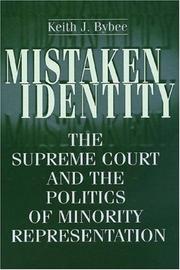| Listing 1 - 4 of 4 |
Sort by
|

ISBN: 0691017298 0691094969 1282753584 9786612753589 1400822777 1400811163 9781400822775 9781400811168 6612753587 9781282753587 9780691017297 9780691094960 Year: 2002 Publisher: Princeton, NJ
Abstract | Keywords | Export | Availability | Bookmark
 Loading...
Loading...Choose an application
- Reference Manager
- EndNote
- RefWorks (Direct export to RefWorks)
Is it ever legitimate to redraw electoral districts on the basis of race? In its long struggle with this question, the U.S. Supreme Court has treated race-conscious redistricting either as a requirement of political fairness or as an exercise in corrosive racial "as. Cutting through these contradictory positions, Keith Bybee examines the theoretical foundations of the Court's decisions and the ideological controversy those decisions have engendered. He uncovers erroneous assumptions about political identity on both sides of the debate and formulates new terms on which minority representation can be pursued. As Bybee shows, the Court has for the last twenty years encouraged a division between individualist and group concepts of political identity. He demonstrates convincingly that both individualist and group proponents share the misguided notion that political identity is formed prior to and apart from politics itself. According to Bybee, this "mistaken identity" should be abandoned for a more flexible, politically informed understanding of who the "people" really are. Thus, a misdirected debate will be replaced by a more considered discussion in which the people can speak for themselves, even as the Court speaks on their behalf. Engaged in the politics of minority representation, the Court will be able to help citizens articulate and achieve more fruitful forms of political community.
Book
ISBN: 0804775613 9780804775618 9780804753111 0804753113 9780804753128 0804753121 Year: 2010 Publisher: Stanford, Calif. Stanford Law Books
Abstract | Keywords | Export | Availability | Bookmark
 Loading...
Loading...Choose an application
- Reference Manager
- EndNote
- RefWorks (Direct export to RefWorks)
We live in an age where one person's judicial "activist" legislating from the bench is another's impartial arbiter fairly interpreting the law. After the Supreme Court ended the 2000 Presidential election with its decision in Bush v. Gore, many critics claimed that the justices had simply voted their political preferences. But Justice Clarence Thomas, among many others, disagreed and insisted that the Court had acted according to legal principle, stating: "I plead with you, that, whatever you do, don't try to apply the rules of the political world to this institution; they do not apply." The legitimacy of our courts rests on their capacity to give broadly acceptable answers to controversial questions. Yet Americans are divided in their beliefs about whether our courts operate on unbiased legal principle or political interest. Comparing law to the practice of common courtesy, Keith Bybee explains how our courts not only survive under these suspicions of hypocrisy, but actually depend on them. Law, like courtesy, furnishes a means of getting along. It frames disputes in collectively acceptable ways, and it is a habitual practice, drummed into the minds of citizens by popular culture and formal institutions. The rule of law, thus, is neither particularly fair nor free of paradoxical tensions, but it endures. Although pervasive public skepticism raises fears of judicial crisis and institutional collapse, such skepticism is also an expression of how our legal system ordinarily functions.
Judicial process --- Political questions and judicial power --- Rule of law
Periodical
Publisher: Stanford Stanford University Press
Abstract | Keywords | Export | Availability | Bookmark
 Loading...
Loading...Choose an application
- Reference Manager
- EndNote
- RefWorks (Direct export to RefWorks)
Book

ISBN: 9781501729843 Year: 2018 Publisher: Ithaca, NY
Abstract | Keywords | Export | Availability | Bookmark
 Loading...
Loading...Choose an application
- Reference Manager
- EndNote
- RefWorks (Direct export to RefWorks)
| Listing 1 - 4 of 4 |
Sort by
|

 Search
Search Feedback
Feedback About UniCat
About UniCat  Help
Help News
News